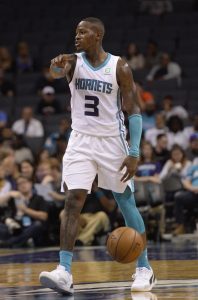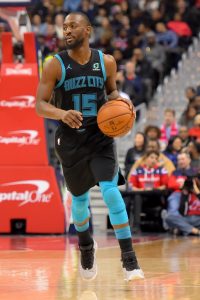Hoops Rumors is breaking down the 2019 offseason for all 30 NBA teams, revisiting the summer’s free agent signings, trades, draft picks, departures, and more. We’ll evaluate each team’s moves from the last several months and look ahead to what the 2019/20 season holds for all 30 franchises. Today, we’re focusing on the Charlotte Hornets.
Signings:
-

Standard contracts:
- Terry Rozier: Three years, $56.7MM. Acquired via sign-and-trade.
- Two-way contracts:
- Non-guaranteed camp contracts:
- Joe Chealey: One year, minimum salary (Exhibit 10).
- Caleb Martin: One year, minimum salary (Exhibit 10).
- Josh Perkins: One year, minimum salary (Exhibit 10).
- Kobi Simmons: One year, minimum salary (Exhibit 10).
- Thomas Welsh: One year, minimum salary (Exhibit 10).
Trades:
- Acquired Terry Rozier (sign-and-trade) and the Celtics’ 2020 second-round pick (top-53 protected) from the Celtics in exchange for Kemba Walker (sign-and-trade) and either the Nets’ or Knicks’ 2020 second-round pick (whichever is less favorable).
Draft picks:
- 1-12: PJ Washington — Signed to rookie contract.
- 2-36: Cody Martin — Signed to three-year, $4.47MM contract. Third year non-guaranteed. Signed using mid-level exception.
- 2-52: Jalen McDaniels — Signed to one-year, minimum-salary contract. Non-guaranteed. Exhibit 10.
Departing players:
- Frank Kaminsky
- Jeremy Lamb
- Shelvin Mack
- J.P. Macura (two-way)
- Tony Parker (Retired; waived)
- Kemba Walker
Other offseason news:
- Tony Parker announced his retirement.
- Michael Jordan sold part of the franchise to minority stakeholders.
- Michael Kidd-Gilchrist underwent groin surgery.
Salary cap situation:
- Remained over the cap.
- Hard-capped.
- Carrying approximately $122.44MM in guaranteed salary.
- $8.08MM of mid-level exception still available (used $1.17MM on Cody Martin).
- Full bi-annual exception ($3.62MM) still available.
Story of the summer:
The Hornets entered the 2019 offseason in a no-win situation, forced to decide between two unfavorable paths.
Re-signing franchise player Kemba Walker would have meant investing between $30-40MM per year in a long-term contract for a point guard who turns 30 years old in the spring. It would have meant either pushing team salary into tax territory for the 2019/20 season or sneaking below the tax line by attaching assets to unwanted contracts in trades. And it would have meant essentially doubling down on a core that had missed the playoffs for three consecutive seasons.
On the other hand, letting Walker go would mean losing the only All-Star on the roster and not getting anything back for him or gaining the cap flexibility necessary to replace him in any meaningful way. The team’s cap would still be overloaded with lucrative contracts for unspectacular veterans with no real way to get out from under those contracts for another year or two.
Once it became clear that Walker wasn’t interested in sticking around for the terms the Hornets were offering (reportedly about $160MM for five years), president of basketball operations Mitch Kupchak attempted to thread the needle between those two unfavorable outcomes by working out a sign-and-trade with the Celtics to get something back for his All-NBA point guard. The result was a three-year, $56MM+ investment in Terry Rozier, who has started 30 career games and has never made more than 39.5% of his field goal attempts in a single season.
An optimist might argue that the Hornets were at least able to get something back for Walker, pointing to Rozier’s impressive 2018 playoff run as proof that he’s capable of more than he showed during a mediocre 2018/19 season. The glass-half-empty argument would be that Rozier wasn’t worth a $56MM investment and will simply become the latest overpaid Hornet, hampering the team’s ability to clear its cap sheet in 2020 and/or 2021.
No matter how the Hornets’ commitment to Rozier plays out, it’s clear that the franchise is entering a new era, one that might get worse before it gets better. Walker’s departure this summer signaled that a full-scale rebuild is on the way.
 Having spent the first eight years of his NBA career in Charlotte, Walker leaves the Hornets as the organization’s all-time leader in points, three-pointers, minutes played, and a handful of other categories. He played his best ball in recent years, earning All-Star nods in each of the last three seasons and making his first All-NBA team in 2019.
Having spent the first eight years of his NBA career in Charlotte, Walker leaves the Hornets as the organization’s all-time leader in points, three-pointers, minutes played, and a handful of other categories. He played his best ball in recent years, earning All-Star nods in each of the last three seasons and making his first All-NBA team in 2019.